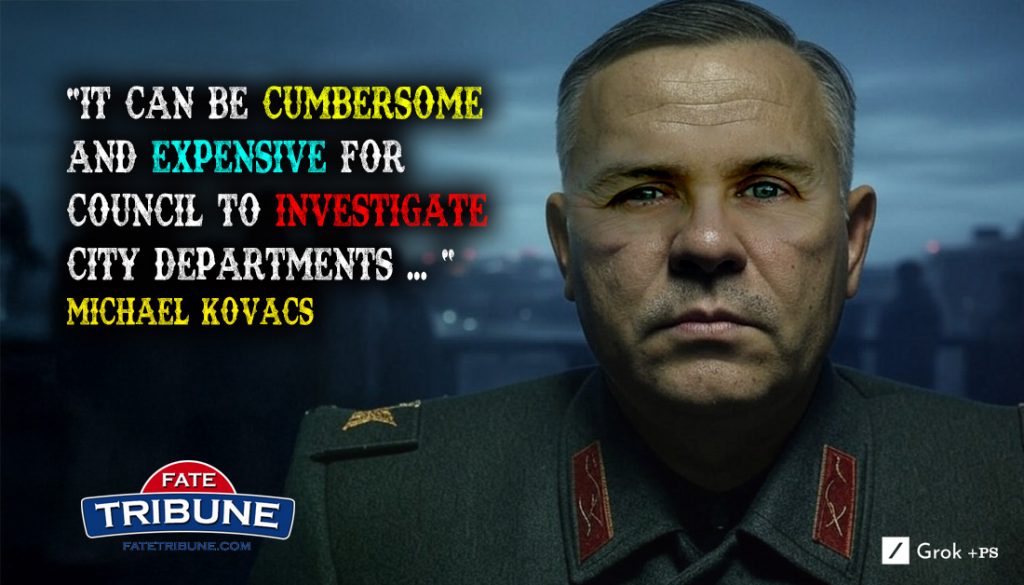Has Michael Kovacs revealed himself as a Closet Socialist?
Fate, TX – The Fate Charter Commission, appointed at the December 2, 2024, City Council meeting, gathers today to discuss a series of controversial proposals from City Manager Michael Kovacs. These amendments to the city charter aim to centralize power in the city manager’s office, weaken citizen oversight, and shield council members from accountability. The timing and substance of these proposals raise serious questions about Kovacs’ motives as his tenure likely nears its end.
The newly appointed Charter Commission includes Callie Beard, Brandon Clayton, Katura Curry, Karen Kiser, Autumnn Lobinsky, John Stacy, Jon Thatcher, and Councilmen Codi Chinn and Lance Megyesi. Kiser and Lobinsky currently serve on the Planning & Zoning Commission, while Stacy is a sitting Rockwall County Commissioner. Thatcher, the city’s former attorney, has a controversial history, including allegations of misleading the public about the text of city-approved legislation. The Fate Tribune previously reported on these allegations in an exposé about the weaponization of city government.
The Proposals: Consolidating Power and Silencing Dissent
Kovacs’ proposed amendments, cloaked in language about efficiency and cost savings, seek to reshape Fate’s government in ways that would empower him and his allies at the expense of the public.
1. Expense Reimbursement Without Council Oversight
Kovacs proposes amending Section 3.03 (Compensation) to allow the city manager to approve council members’ expense reimbursements without council review. He argues this change would eliminate a procedural formality.
However, this move would remove a key check on public spending. The Fate Tribune has repeatedly reported on council members abusing taxpayer dollars by attending unnecessary junkets disguised as conferences or training. Allowing Kovacs to approve reimbursements unilaterally would obscure accountability and enable wasteful spending by council members.
2. Weakening Council Investigative Powers
In Section 3.05 (Powers and Duties of the City Council), Kovacs recommends removing the council’s authority to investigate city departments, calling it “cumbersome and expensive.”
This proposal would strip the council of a vital tool for holding city staff accountable. Critics argue it’s another step toward consolidating power in the city manager’s office while shielding department heads and staff from public oversight.
3. Curtailing Citizen Initiatives, Referendums, and Recalls
Perhaps the most troubling is Kovacs’ proposed revision of Article 5 (Initiative, Referendum, and Recall). He claims the rise of social media and “special interest groups” poses a risk of misuse by the electorate.
In reality, Kovacs is targeting citizens’ ability to hold their government accountable. His proposal aims to weaken the public’s right to recall corrupt council members or force the council to act on referendums proposed by voters. Kovacs has long shown disdain for residents who use social media to criticize his administration, making this an attempt to stifle dissent and consolidate authority.
4. Eliminating Council Budgetary Control
In Section 6.06 (Contingent Appropriation), Kovacs seeks to eliminate a discretionary budget line item controlled by the council. Though only $2,500 in the current fiscal year, it serves as a modest fund for unforeseen needs.
Kovacs argues this line item is unnecessary given the city’s reserves. However, removing it would further erode the council’s independent financial authority, leaving all budgetary decisions under the city manager’s control.
A Pattern of Strong Towns Ideology
Kovacs has long been a proponent of the “Strong Towns” movement, a central-planning philosophy often at odds with the values of small-town governance. This ideology prioritizes government control and discourages citizen-led initiatives, a theme evident in his proposed charter revisions.
These amendments are not just administrative tweaks—they represent a broader attempt to entrench Strong Towns principles into Fate’s charter, limiting citizen oversight and ensuring government operates on his terms, not the public’s.
A Desperate Power Grab as His Tenure Nears Its End
Kovacs’ motivations are clear. With a new council majority set to take office in May, his tenure as city manager is likely nearing its end. His proposals reflect a desperate attempt to consolidate his power, and protect loyal allies on the current council.
Critics argue these actions betray the public trust. “Kovacs knows his time is up,” said longtime Fate resident J.M. “He’s trying to rewrite the rules to benefit himself and his comrades, while silencing the voices of the people he’s supposed to serve.”
A Controversial Charter Commission
The composition of the Charter Commission itself has sparked concern. Karen Kiser and Autumnn Lobinsky bring experience from the Planning & Zoning Commission, but their alignment with Kovacs’ vision of governance is well known. John Stacy, a Rockwall County Commissioner, adds political weight to the group, but his priorities do not align with residents seeking greater accountability.
Jon Thatcher’s appointment is particularly contentious. As Fate’s former city attorney, he was accused of misleading the public about the text of city-approved legislation, a claim detailed in the Fate Tribune’s report on the weaponization of city government. His role on the commission raises doubts about the impartiality of the process.
The Battle for Fate’s Future
Today’s meeting will determine whether the Charter Commission sides with the people or enables a city manager desperate to cement his authority. Kovacs’ proposals threaten to erode transparency, accountability, and citizen empowerment, leaving Fate governed by an insulated bureaucracy rather than its residents.
The stakes are high. If Kovacs succeeds, Fate’s government will be fundamentally reshaped in ways that prioritize power for a select few over the rights of its citizens. As the meeting unfolds, the public must demand that their voices be heard—and that their government remains accountable to the people it serves.
It is important to note, however, that the Charter Commission’s proposals are merely advisory. Any recommended changes must be approved by the City Council and ultimately ratified by Fate voters before taking effect. This ensures that the residents of Fate retain the final say in shaping their city’s future.

